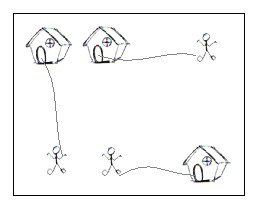Going Home
Time Limit: 10000/5000 MS (Java/Others) Memory Limit: 65536/32768 K (Java/Others)Total Submission(s): 3338 Accepted Submission(s): 1692
Problem Description
On a grid map there are n little men and n houses. In each unit time, every little man can move one unit step, either horizontally, or vertically, to an adjacent point. For each little man, you need to pay a $1 travel fee for every step he moves, until he enters a house. The task is complicated with the restriction that each house can accommodate only one little man.
Your task is to compute the minimum amount of money you need to pay in order to send these n little men into those n different houses. The input is a map of the scenario, a '.' means an empty space, an 'H' represents a house on that point, and am 'm' indicates there is a little man on that point.

You can think of each point on the grid map as a quite large square, so it can hold n little men at the same time; also, it is okay if a little man steps on a grid with a house without entering that house.
Your task is to compute the minimum amount of money you need to pay in order to send these n little men into those n different houses. The input is a map of the scenario, a '.' means an empty space, an 'H' represents a house on that point, and am 'm' indicates there is a little man on that point.

You can think of each point on the grid map as a quite large square, so it can hold n little men at the same time; also, it is okay if a little man steps on a grid with a house without entering that house.
Input
There are one or more test cases in the input. Each case starts with a line giving two integers N and M, where N is the number of rows of the map, and M is the number of columns. The rest of the input will be N lines describing the map. You may assume both N and M are between 2 and 100, inclusive. There will be the same number of 'H's and 'm's on the map; and there will be at most 100 houses. Input will terminate with 0 0 for N and M.
Output
For each test case, output one line with the single integer, which is the minimum amount, in dollars, you need to pay.
Sample Input
2 2 .m H. 5 5 HH..m ..... ..... ..... mm..H 7 8 ...H.... ...H.... ...H.... mmmHmmmm ...H.... ...H.... ...H.... 0 0
Sample Output
2 10 28
Source
暴力建图,,,本题是求最小的匹配,可以把权值全部变成负的,然后套KM算法模板就行了,最后统计答案的时候应该加权值的相反数。
定的时间是5秒,但很多人15ms就过了,,,数据略水。。
#include<map>
#include<vector>
#include<cstdio>
#include<iostream>
#include<cstring>
#include<string>
#include<algorithm>
#include<cmath>
#include<stack>
#include<queue>
#include<set>
#define inf 0x3f3f3f3f
#define mem(a,x) memset(a,x,sizeof(a))
using namespace std;
typedef long long ll;
typedef pair<int,int> pii;
inline int in()
{
int res=0;char c;
while((c=getchar())<'0' || c>'9');
while(c>='0' && c<='9')res=res*10+c-'0',c=getchar();
return res;
}
const int N=102;
int g[N][N];
int lx[N];int ly[N];
int visx[N];
int visy[N];
char maze[N][N];
int match[N];
int slack[N];
int n,m;
bool dfs(int x,int tmp)
{
visx[x]=1;
for(int i=1;i<=tmp;i++)
{
if(visy[i])continue;
int t=lx[x]+ly[i]-g[x][i];
if(t==0)
{
visy[i]=1;
if(match[i]==-1 || dfs(match[i],tmp))
{
match[i]=x;
return 1;
}
}
else if(slack[i]>t)slack[i]=t;
}
return 0;
}
int KM(int cnt,int tmp) //KM算法模板...
{
mem(match,-1);
mem(ly,0);
for(int i=1;i<=cnt;i++)
{
lx[i]=-inf;
for(int j=1;j<=tmp;j++)
{
lx[i]=max(lx[i],g[i][j]);
}
}
for(int j=1;j<=cnt;j++)
{
mem(slack,inf);
while(1)
{
mem(visx,0);
mem(visy,0);
if(dfs(j,tmp))break;
int d=inf;
for(int i=1;i<=cnt;i++)
{
if(!visy[i] && d>slack[i]) d=slack[i];
}
for(int i=1;i<=cnt;i++)
{
if(visx[i])lx[i]-=d;
if(visy[i])ly[i]+=d;
else slack[i]-=d;
}
}
}
int ans=0;
for(int i=1;i<=cnt;i++)
{
if(match[i]!=-1)ans+=-g[match[i]][i]; //加权值的相反数
}
return ans;
}
int main()
{
while(~scanf("%d%d",&n,&m) && n)
{
for(int i=0;i<n;i++)
{
scanf("%s",maze[i]);
}
int cnt=0; //计数人的数目的
int tmp=0; //房子数目
for(int i=0;i<n;i++)//建图,直接暴力建图
{
for(int j=0;j<m;j++)
{
if(maze[i][j]=='m')
{
++cnt;
tmp=0;
for(int k=0;k<n;k++)
{
for(int x=0;x<m;x++)
{
if(maze[k][x]=='H')
{
++tmp;
g[cnt][tmp]=-(abs(i-k)+abs(j-x));//变为负的
}
}
}
}
}
}
printf("%d\n",KM(cnt,tmp));
}
return 0;
}






















 4万+
4万+

 被折叠的 条评论
为什么被折叠?
被折叠的 条评论
为什么被折叠?








